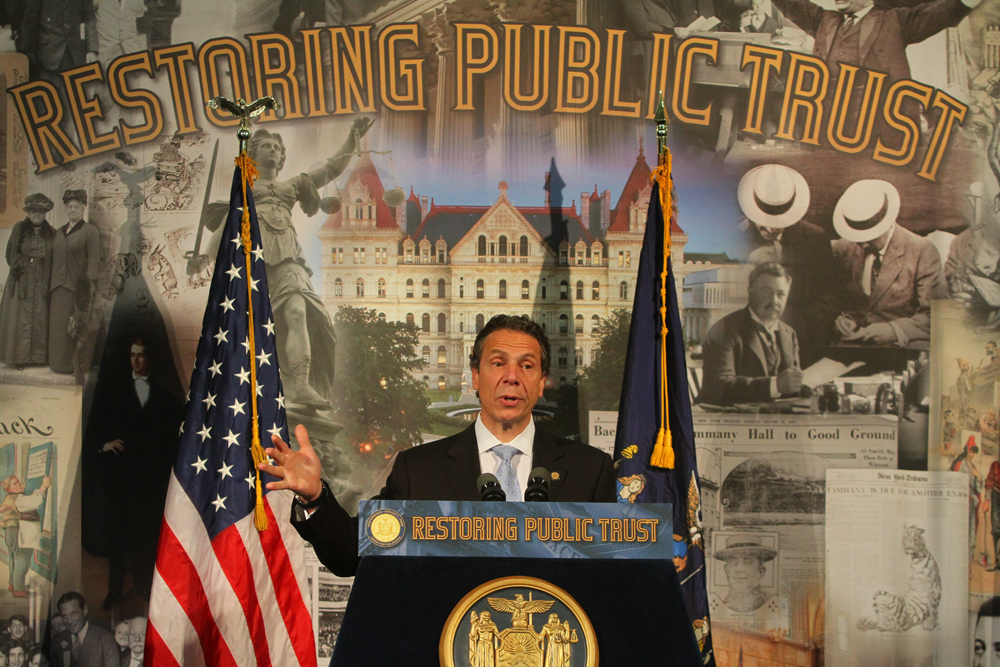
Gov. Andrew Cuomo delivers speech in support of campaign finance reform at the University at Buffalo Law School in Amherst, NY, June 12, 2013. (AP Photo/The Buffalo News, John Hickey)
In 2010, while running for his first term as governor of New York State, Democrat Andrew Cuomo stood in front of the old Tweed Courthouse in Manhattan – named for 19th century politician Boss Tweed, the notorious, corrupt king of Tammany Hall — and proclaimed, “Albany’s antics today could make Boss Tweed blush.”
Cuomo released a 115-page book on the need for ethics in politics and government. And in 2013, he appointed a commission of current and former prosecutors to investigate and rid the state government of graft (it was named the Moreland Commission, after a 1907 statute that authorizes the governor or those appointed by him to “examine and investigate the management and affairs of any department, board, bureau or commission of the state.”).
But in March, Governor Cuomo abruptly shut the Moreland Commission down. As The New York Times reports today, “He set it up with public promises that it would be independent. But… Mr. Cuomo repeatedly meddled in the commission’s work when it sought to scrutinize groups with ties to him.”
What’s going on in New York State is an object lesson for good government and campaign finance reform groups all over the country. Luckily, federal prosecutors have picked up where the commission left off, and now, Thomas Kaplan, William K. Rashbaum and Susanne Craig of the Times have conducted an extensive investigation “centered largely on how politicians were taking advantage of gaps in the law, and exploiting weaknesses in its enforcement, to raise money for campaigns as well as to enrich themselves personally. And those gaps and weaknesses remain.”
The reporters write that, “In Albany, some of the most questionable conduct by elected officials has long been perfectly legal, safeguarded by the only people who can outlaw it: the lawmakers themselves.” Critics claim this conduct includes such excesses as masking “political payoffs under the guise of part-time jobs,” allowing corporations “to funnel huge donations… in smaller gifts that disguise the true sources of the money,” and politicians using “their campaign treasuries as piggy banks for personal expenses.” In the latter category, campaign money allegedly had been diverted to Mexican vacations, shopping at Brooks Brothers and a chocolatier, an auto body shop, cat food and a swimming pool cover.
Governor Cuomo continues to call for reform, but the Times notes:
In March, when Mr. Cuomo disbanded the commission in exchange for new ethics laws, those statutes failed to address the fund-raising practices that most troubled the panel’s members and seemed unlikely to make a dent in what they called Albany’s ‘pay-to-play political culture driven by large checks.
Mr. Cuomo easily won a second term in November. To pave the way for that victory, he raised about $47 million — much of it through the same kinds of enormous donations that the commission was building a case to outlaw.
You can read more about the investigation in The New York Times.

This work is licensed under a Creative Commons Attribution-NoDerivatives 4.0 International License.



